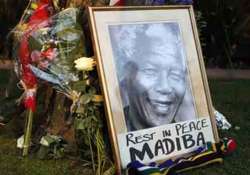Nelson Mandela Burial Planned For December 15
Johannesburg: South Africans erupted in song, dance and tears on Friday in public and emotional celebrations of the life of Nelson Mandela, the anti-apartheid leader who bridged this country's black-white divide and helped avert a

Johannesburg: South Africans erupted in song, dance and tears on Friday in public and emotional celebrations of the life of Nelson Mandela, the anti-apartheid leader who bridged this country's black-white divide and helped avert a race war.
Fellow anti-apartheid leaders like retired archbishop Desmond Tutu called for the 51 million South Africans to adhere to the values of unity and democracy that Mandela embodied. The tributes to Mandela that came from people across the spectrum showed that he had affected people deeply.
"What I liked most about Mandela was his forgiveness, his passion, his diversity, the pact of what he did," said Ariel Sobel, a white man who was born in 1993, a year before Mandela was elected president. "I am not worried about what will happen next. We will continue as a nation. We knew this was coming. We are prepared."
Sobel was with a crowd of people who had gathered at Mandela's home in the leafy Johannesburg neighborhood of Houghton where Mandela spent his last sickly months. A dozen doves were released into the skies and people sang tribal songs, the national anthem, God Bless Africa — the anthem of the anti-apartheid struggle — and Christian hymns.
Many wore traditional garb of Zulu, Xhosa and South Africa's other ethnic groups. One carried a sign saying: "He will rule the universe with God."
In Soweto, the rough and tumble black township where Mandela used to live, pockets of dancers and singers shuffled through the street, celebrating Mandela's life. Dozens of kids held oversized pictures of the anti-apartheid icon.
"I'm sorry, I'm too emotional. The tears come too easily," Themba Radebe, a 60-year-old who was filming the street celebration with his phone, told a reporter. He later decided to share his thoughts.
"This is a celebration of the death, because we knew he was an old man," said Radebe, whose eyes sparkled with shallow tears. "He brought a lot of changes to our community, because I grew up in apartheid. It was a very bad situation."
Fellow anti-apartheid leaders like retired archbishop Desmond Tutu called for the 51 million South Africans to adhere to the values of unity and democracy that Mandela embodied. The tributes to Mandela that came from people across the spectrum showed that he had affected people deeply.
"What I liked most about Mandela was his forgiveness, his passion, his diversity, the pact of what he did," said Ariel Sobel, a white man who was born in 1993, a year before Mandela was elected president. "I am not worried about what will happen next. We will continue as a nation. We knew this was coming. We are prepared."
Sobel was with a crowd of people who had gathered at Mandela's home in the leafy Johannesburg neighborhood of Houghton where Mandela spent his last sickly months. A dozen doves were released into the skies and people sang tribal songs, the national anthem, God Bless Africa — the anthem of the anti-apartheid struggle — and Christian hymns.
Many wore traditional garb of Zulu, Xhosa and South Africa's other ethnic groups. One carried a sign saying: "He will rule the universe with God."
In Soweto, the rough and tumble black township where Mandela used to live, pockets of dancers and singers shuffled through the street, celebrating Mandela's life. Dozens of kids held oversized pictures of the anti-apartheid icon.
"I'm sorry, I'm too emotional. The tears come too easily," Themba Radebe, a 60-year-old who was filming the street celebration with his phone, told a reporter. He later decided to share his thoughts.
"This is a celebration of the death, because we knew he was an old man," said Radebe, whose eyes sparkled with shallow tears. "He brought a lot of changes to our community, because I grew up in apartheid. It was a very bad situation."